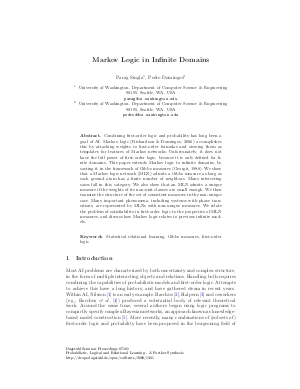Markov Logic in Infinite Domains
Authors Pedro Domingos, Parag Singla
-
Part of:
Volume:
Dagstuhl Seminar Proceedings, Volume 7161
Part of: Series: Dagstuhl Seminar Proceedings (DagSemProc) - License:
 Creative Commons Attribution 4.0 International license
Creative Commons Attribution 4.0 International license
- Publication Date: 2008-03-06
File

PDF
DagSemProc.07161.6.pdf
- Filesize: 199 kB
- 16 pages
Document Identifiers
Subject Classification
Keywords
- Markov logic networks
- Gibbs measures
- first-order logic
- infinite probabilistic models
- Markov networks
Metrics
- Access Statistics
-
Total Accesses (updated on a weekly basis)
0PDF Downloads0Metadata Views
Abstract
Markov logic combines logic and probability by attaching weights to first-order formulas, and viewing them as templates for features of Markov networks. Unfortunately, in its original formulation it does not have the full power of first-order logic, because it applies only to finite domains. Recently, we have extended Markov logic to infinite domains, by casting it in the framework of Gibbs measures. In this talk I will summarize our main results to date, including sufficient conditions for the existence and uniqueness of a Gibbs measure consistent with an infinite MLN, and properties of the set of consistent measures in the non-unique case. (Many important phenomena, like phase transitions, are modeled by non-unique MLNs.) Under the conditions for existence, we have extended to infinite domains the result in Richardson and Domingos (2006) that first-order logic is the limiting case of Markov logic when all weights tend to infinity. I will also discuss some fundamental limitations of Herbrand interpretations (and representations based on them) for probabilistic modeling of infinite domains, and how to get around them. Finally, I will discuss some of the surprising insights for learning and inference in large finite domains that result from considering the infinite limit.
Cite As Get BibTex
Pedro Domingos and Parag Singla. Markov Logic in Infinite Domains. In Probabilistic, Logical and Relational Learning - A Further Synthesis. Dagstuhl Seminar Proceedings, Volume 7161, pp. 1-16, Schloss Dagstuhl – Leibniz-Zentrum für Informatik (2008)
https://doi.org/10.4230/DagSemProc.07161.6
BibTex
@InProceedings{domingos_et_al:DagSemProc.07161.6,
author = {Domingos, Pedro and Singla, Parag},
title = {{Markov Logic in Infinite Domains}},
booktitle = {Probabilistic, Logical and Relational Learning - A Further Synthesis},
pages = {1--16},
series = {Dagstuhl Seminar Proceedings (DagSemProc)},
ISSN = {1862-4405},
year = {2008},
volume = {7161},
editor = {Luc de Raedt and Thomas Dietterich and Lise Getoor and Kristian Kersting and Stephen H. Muggleton},
publisher = {Schloss Dagstuhl -- Leibniz-Zentrum f{\"u}r Informatik},
address = {Dagstuhl, Germany},
URL = {https://drops.dagstuhl.de/entities/document/10.4230/DagSemProc.07161.6},
URN = {urn:nbn:de:0030-drops-13811},
doi = {10.4230/DagSemProc.07161.6},
annote = {Keywords: Markov logic networks, Gibbs measures, first-order logic, infinite probabilistic models, Markov networks}
}
